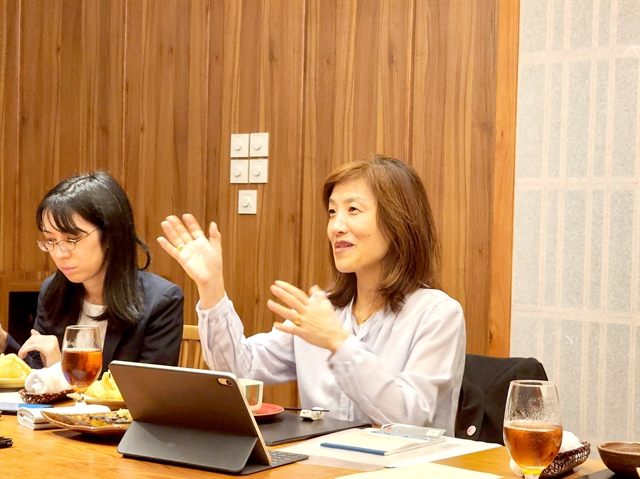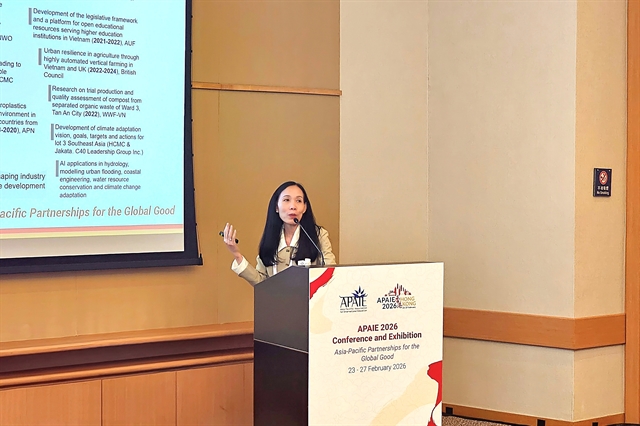 Politics & Law
Politics & Law

 |
| Spokeswoman for the Japanese Ministry of Foreign Affairs Maki Kobayashi. — VNS Photo Trọng Kiên |
HÀ NỘI — Japan's authorities are considering easing entry procedures for Vietnamese citizens to boost tourist numbers, the spokeswoman for the Japanese Ministry of Foreign Affairs Maki Kobayashi stated.
The visa issues for Vietnamese travellers were raised during her meeting with the press held in Hà Nội as part of the visit by Japanese top diplomat Yoko Kamikawa to Việt Nam on October 10-11.
Kobayashi, the spokesperson for the Japanese Ministry of Foreign Affairs, added that it might take some time for the changes and there are some hurdles against longer validity for visas for Vietnamese on caution of possible higher crime rates.
While it may not involve a complete visa waiver, there are other ways to make the visa system more convenient for travellers from Việt Nam to visit Japan, the spokeswoman noted.
Between 2015 to 2019, the number of Japanese tourists visiting Việt Nam increased by 1.4 times, from 671,000 visitors in 2015 to 952,000 visitors in 2019, with an average annual growth rate of 9.1 per cent, meanwhile the number of Vietnamese arrivals to Japan is about 495,000, or half of the other direction.
This figure needs improvement to increase the number of tourists between the two countries, the spokeswoman said.
Earlier on Tuesday, Vietnamese foreign minister Bùi Thanh Sơn in his talks with the Japanese counterpart proposed that Japan take steps to create favourable conditions, and simplify visa procedures for Vietnamese citizens, for example, including Việt Nam in the list of countries eligible for electronic visas, granting long-term visas (5-10 years) to Vietnamese citizens who have visited Japan multiple times without legal violations, and moving toward visa waivers for Vietnamese citizens.
About whether ODA (Official Development Assistance) funding for countries could be affected by Japan's budget deficit, Kobayashi mentioned that the Japanese government has decided to continue its cooperation with close partner countries and Japan has recently adopted a new approach to its ODA policy.
Japan traditionally waited for ODA recipient countries to express their priorities or desired projects. However, Japan is now actively proposing ideas to partner countries to expedite the preparation process and align with the new policy.
Japan has set out key policy priorities for ODA, which include sustainable growth, maintaining and enhancing international order and openness, and leading in addressing increasingly complex and serious global issues such as climate change, public health, and disaster management.
During a meeting with the Japanese foreign minister, Vietnamese Prime Minister Phạm Minh Chính suggested that Japan provide new-generation ODA for large-scale strategic infrastructure development projects in Việt Nam, such as roads and railways.
PM Chính praised the Japanese government's allocation of ODA funding to Việt Nam in the past and called for close cooperation to accelerate the progress of long-delayed projects including urban railway systems in Hà Nội and HCM City, as well as the construction of Chợ Rẫy Hospital's second facility.
The Japanese spokeswoman said Japan and Việt Nam will have discussions on measures to speed up the progress of these projects, and that Japan is interested in helping the development of not only traditional infrastructure projects in Việt Nam and in ASEAN but also digital ones.
The spokeswoman also affirmed that Japan treasured relations with Việt Nam, which it considered a very important partner country, especially within ASEAN that is driving for a stable and prosperous region.
"We believe that we share the same challenges, not only security issues, but also all these common challenges, that we should sort of share wisdom and knowledge and work together," she remarked mentioning severe international situations, high speed technological development, and coping with disinformation as common challenges.
"We believe that with Việt Nam, we are on the same page on most of, if not all, the issues. That's the reason why we can really work together and we've been working together, but we can work more as good partners," she said. — VNS




